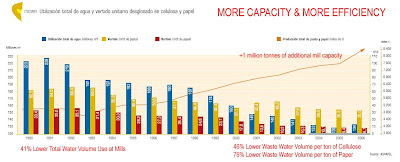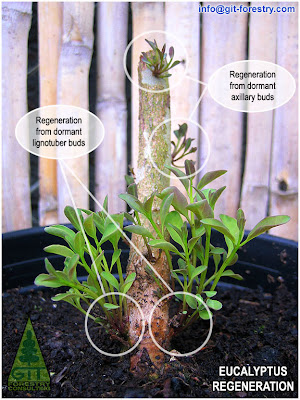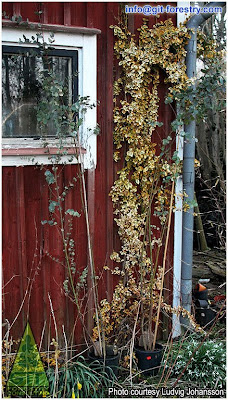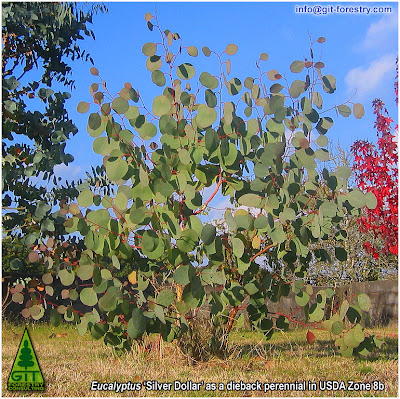A couple of weeks ago
ASPAPEL (Asociación Española de Fabricantes de Pasta, Papel y Cartón) made public the
Second Edition of a Sustainability Report (PDF, 5.2 MB) summarising the
state-of-the-art for the Pulp & Paper industrial chain in Spain for the triennium 2004-2006.
This report is the result of a
Public Consultation Process involving not just the Spanish Pulp & Paper Industry but also
representative stakeholders concerned by sustainability as governmental agencies, large paper consumers, landowners, trade unions, non governmental organisations and universities, whose proposals and concerns have been incorporated into the current edition or have positively contributed to the addition of new criteria & indicators for a better monitoring of the sector within the frame of this
ongoing participatory process.

ASPAPEL - Papermaking Sustainability Receipt 2008
(Click image to download, PDF 5.2MB)
The
opinions and contributions made during the Consultation Process were assessed, validated and verified as accurate and relevant by Bureau Veritas Certification, an independent third party with the role of securing
neutrality of all contributions and providing a
guarantee of transparency and traceability for the information and data processed.
Many of the
macro-magnitudes presented in
this report throw some light on
key points for Spanish Pulp & Paper Industry Sustainability, as size of timber resources and timber sourcing rates, employment statistics for supply chains, sustainability of forest management practices, positive externalities derived from carbon sink effects, greenhouse gas emissions at mills, water & chlorine use, progresses with ISO & EMAS environmental management systems at industrial processes, residues and subproducts of pulp and paper-making, fibre recycling and a long etc.
EUCALYPTOLOGICS' staff frequently receives
inquiries from concerned citizens worldwide about the sustainability of
Eucalyptus cultivated forests wondering if the information provided by some media and some of the commonly spread general knowledge are accurate enough. It has been estimated
there are some 300 myths on Eucalyptus cultivation that do not resist a logical examination or should at least be put into quarantine status.
Due to the insistence of
one of our worried readers, there it goes a first batch of commented macro-magnitudes (facts) in a group of seven.
EUCALYPTUS "TAKING OVER THE WORLD"? Nope.
MYTH: Eucalyptus monocultures are taking over and destroying natural forests in Spain
FACT: +50% cellulosic pulpwood is produced in just 3% of Spanish forestland
 Fig. 1: Forestland acreage in Spain and pulpwood resources (Click image to enlarge)SPANISH FOREST INDUSTRY "PULPING THE SOUTH"? Nope.MYTH:
Fig. 1: Forestland acreage in Spain and pulpwood resources (Click image to enlarge)SPANISH FOREST INDUSTRY "PULPING THE SOUTH"? Nope.MYTH: Spanish Pulp & Paper Industry is "Pulping the South"
FACT: 75% of mill capacity in Spain is fulfilled with
locally grown timber, majority of which is
Eucalyptus
 Fig. 2: Timber resources used by Spanish pulp & paper industry. (Click image to enlarge)
Fig. 2: Timber resources used by Spanish pulp & paper industry. (Click image to enlarge)
GROWING EUCALYPTUS IS EVIL? Nope.MYTH: Eucalyptus cultivation only creates irreversible negative environmental impacts
FACT: 1 hectare of
Eucalyptus cultivated forest stores 580% more CO2 than the average hectare of forestland in Spain
 Fig. 3: CO2 storage in Spanish forestlands. (Click image to enlarge)EUCALYPTUS PULP MILLS ARE "ECOLOGICAL CRIMINALS"? Nope.MYTH:
Fig. 3: CO2 storage in Spanish forestlands. (Click image to enlarge)EUCALYPTUS PULP MILLS ARE "ECOLOGICAL CRIMINALS"? Nope.MYTH: Spanish pulp & paper industry is too pollutant and must be closed or relocated
FACT: 93% Cellulosic pulp mills in Spain are into Sustainability & Environmental Certification Processes for their factory processes and supply chains
 Fig. 4: Custody-chain certified pulp mills and supply chains in Spain. (Click image to enlarge)GROWING EUCALYPTUS IS NEGATIVE FOR THE ENVIRONMENT? Nope.MYTH: Eucalyptus
Fig. 4: Custody-chain certified pulp mills and supply chains in Spain. (Click image to enlarge)GROWING EUCALYPTUS IS NEGATIVE FOR THE ENVIRONMENT? Nope.MYTH: Eucalyptus cultivation is an environmental catastrophe
FACT: Professionally managed
Eucalyptus cultivated forests in Spain are
certified to a 94% by third parties as sustainably managed under
PEFC or
FSC standards
 Fig. 5: Sustainable management certification impact on industry managed timberland acreage. (Click image to enlarge)EUCALYPTUS PULP MILLS WASTE AND POLLUTE WATER WITH NO CONTROL? Nope.
Fig. 5: Sustainable management certification impact on industry managed timberland acreage. (Click image to enlarge)EUCALYPTUS PULP MILLS WASTE AND POLLUTE WATER WITH NO CONTROL? Nope.
MYTH: Eucalyptus pulp mills are voracious consumers of water beyond what is acceptable
FACT: Eco-efficiency policies at Spanish pulp & paper mills yielded 1 million extra tonnage and 41% less water use since 1992
 Fig. 6: Trends of water consumption and waste water generation at Spanish pulp & paper mills (1990-2006). (Click image to enlarge)
Fig. 6: Trends of water consumption and waste water generation at Spanish pulp & paper mills (1990-2006). (Click image to enlarge)
We are firmly convinced a
good amount of myth propagators are just missinformed individuals with a narrow view of forestry in general and the interconnections of forestry, environment, industry and ecology in particular.
EUCALYPTOLOGICS must contribute to a proper
dissemination of sound information and to the
education of general audience on these important topics no matter if at local, regional, national or global scale. And
renewable, recyclable and sustainable primary resources as Eucalyptus timber is can achieve the category of strategic from many standpoints. Our overpopulated greenish Gaia needs of a wise use of its finite resources to support itself in the long term or it will perish.
 GIT's Eucalyptology Topics
GIT's Eucalyptology Topics Subscribe to receive EUCALYPTOLOGICS via RSS
Subscribe to receive EUCALYPTOLOGICS via RSS
 Fig. 1: Example of Eucalyptus plus tree as source of information on silviculture, wood properties, tree genetics and stand dynamics. (Click image to enlarge, 1024 x 768 px)
Fig. 1: Example of Eucalyptus plus tree as source of information on silviculture, wood properties, tree genetics and stand dynamics. (Click image to enlarge, 1024 x 768 px) Fig. 2: Cold temperate Eucalyptus pulpwood harvest operations in Galicia
Fig. 2: Cold temperate Eucalyptus pulpwood harvest operations in Galicia Fig. 3: Winter view of a 10 year old frost tolerant Eucalyptus cultivated forest at 800 m above sea level in Galicia (Northwestern Spain).
Fig. 3: Winter view of a 10 year old frost tolerant Eucalyptus cultivated forest at 800 m above sea level in Galicia (Northwestern Spain). Fig. 4: Different simultaneous stages of the reproductive cycle and seed maturation process in a standing Snow Gum Eucalyptus tree.
Fig. 4: Different simultaneous stages of the reproductive cycle and seed maturation process in a standing Snow Gum Eucalyptus tree. Fig. 5: Examples of cold hardy Eucalyptus forestry seedling commercial nursery stock for afforestation.
Fig. 5: Examples of cold hardy Eucalyptus forestry seedling commercial nursery stock for afforestation. Subscribe to receive EUCALYPTOLOGICS via RSS


























